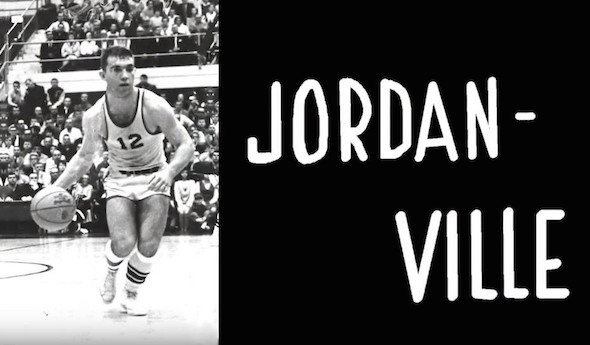
Film Fills In Picture of 'Fennville Flash'
By
Ron Pesch
MHSAA historian
December 28, 2017
We’ve been here before, but not in this way.
The last time was for a retrospective, covering one of the most impressive and awe-inspiring prep careers in Michigan high school history. That time was in print, and included a handful of still images that tried to illustrate the unbelievable.
But this time, the story is in documentary form. It’s woven together from grainy, scratched, faded silent film, a format of capturing memories familiar to thousands of people from generations past, as well as a series of modern-day high-resolution interviews.
Here, the basketball life of the athlete known as the “Fennville Flash” delivers on many levels. Yes, there is a Richie Jordan.
JordanVille, a documentary by John Mooy & Anne Colton, recalls a time when legend spread via word of mouth, newsprint and AM radio.
While it’s hard to comprehend for many today, the exploits of our athletic heroes were formed by “poets in the press box” who sat with pencil and paper, a typewriter, a microphone or a telephone, and described to their audience what they witnessed. On the receiving end, readers and listeners conjured up visualizations based on the facts, phrases and superlatives designed to create an image.
“Traveling left to right on your radio dial” helped listeners feel they were a member of the crowd, seated in the stands, in on the action and a witness to the mayhem. “Packed to the rafters,” reminded fans the importance of what was happening. An exciting game, presented by those with skill, created an event you longed to see. If a broadcast couldn’t be picked up on a transistor or tube radio, the final result might not be known, at the earliest, until the following day’s newspaper arrived.
I’ve told Jordan’s story via the MHSAA before; how he latched on to athletic training, weights and repetition to mold himself into a well-rounded athlete, able to leap to heights unexpected for a kid with a 5-foot-7 frame. The tales of his unfathomable accomplishments slowly leaked beyond the city limits of Fennville into Kalamazoo and greater Southwestern Michigan, then to Detroit. When Detroit Free Press writer Hal Schram relayed Jordan’s feats, the secret traveled across the state and beyond its drawn borders.
From there the legend of Jordan’s accomplishments grew. In Fennville, as in many small towns across the country, the city shut down when a game was played. The Jordan story was so enticing that thousands would travel vast distances to see him play with their own eyes. Today, his single season scoring average of 44.4 points per game during the 1964-65 campaign still remains the top mark in the MHSAA record book.
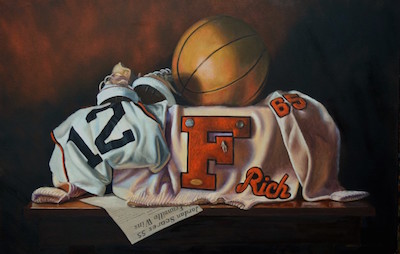 JordanVille runs just shy of a half hour. Contained within is insight into the athlete that is challenging to relay in print form. Thanks to access to home movies and a series of interviews with Jordan, former teammates, past opponents and his high school coach, the determination, dedication and drive of a kid who wouldn’t let physical size be a deterrent from achievement radiates from the screen. On display is small town America at its finest, and perspective formed over 50+ years.
JordanVille runs just shy of a half hour. Contained within is insight into the athlete that is challenging to relay in print form. Thanks to access to home movies and a series of interviews with Jordan, former teammates, past opponents and his high school coach, the determination, dedication and drive of a kid who wouldn’t let physical size be a deterrent from achievement radiates from the screen. On display is small town America at its finest, and perspective formed over 50+ years.
For Mooy, it completes a filmmaking journey started six years ago. But the story of Jordan, in his eyes, date back to his school days. Mooy first heard about Jordan as a 7th-grader from a math teacher. A second-team all-St. Joseph Valley League selection, Mooy played at Marcellus High School and scrimmaged against Jordan and the Fennville Blackhawks.
He couldn’t believe his eyes.
“Everyone wanted to see this kid play,” said Mooy in 2011. “He was the first high school player I saw sign an autograph.
Today, with the interviews complete, and the film ready for viewing, Mooy sees more than just a sports story:
“With the benefit of years now passed, I look at the Rich Jordan story with a new respect. JordanVille created a place that was welcoming no matter who you were, or what color your skin happened to be. It was the 1960s. Rich was growing up Jewish, the Civil Rights Movement was in full swing, and the Vietnam War was on everyone's mind. And in Fennville, Michigan, from 1961 to 1965, the Jordan high school years, there were lessons beyond sports being learned by everyone that would last a lifetime. The Jordan household, under the guidance of (his parents) Tuffy and Sylvia Jordan, is where the story begins."
The film speaks of a time that has departed. Competition for our attention was less focused; phones hung on walls or sat on tabletops, communities were tighter, the training table featured peanut butter and chocolate milk instead of protein powder. A city could easily be renamed for a day.
The film also reminds us that those days were far from perfect.
If all goes as planned, the public will see the finished product come the flip of the calendar. In West Michigan, JordanVille is scheduled to show on New Year’s Day at 6 p.m. on WGVU, and will repeat on WGVU-Life at 7:30 p.m., Friday, Jan. 5.
Seek it out, and spread the word, just like in days of old.
 Ron Pesch has taken an active role in researching the history of MHSAA events since 1985 and began writing for MHSAA Finals programs in 1986, adding additional features and "flashbacks" in 1992. He inherited the title of MHSAA historian from the late Dick Kishpaugh following the 1993-94 school year, and resides in Muskegon. Contact him at [email protected] with ideas for historical articles.
Ron Pesch has taken an active role in researching the history of MHSAA events since 1985 and began writing for MHSAA Finals programs in 1986, adding additional features and "flashbacks" in 1992. He inherited the title of MHSAA historian from the late Dick Kishpaugh following the 1993-94 school year, and resides in Muskegon. Contact him at [email protected] with ideas for historical articles.
PHOTOS: (Top) Richie Jordan runs Fennville's offense during his thrilling high school career in the 1960s. (Middle) Jordan memorabilia, as captured by Bill Williams.
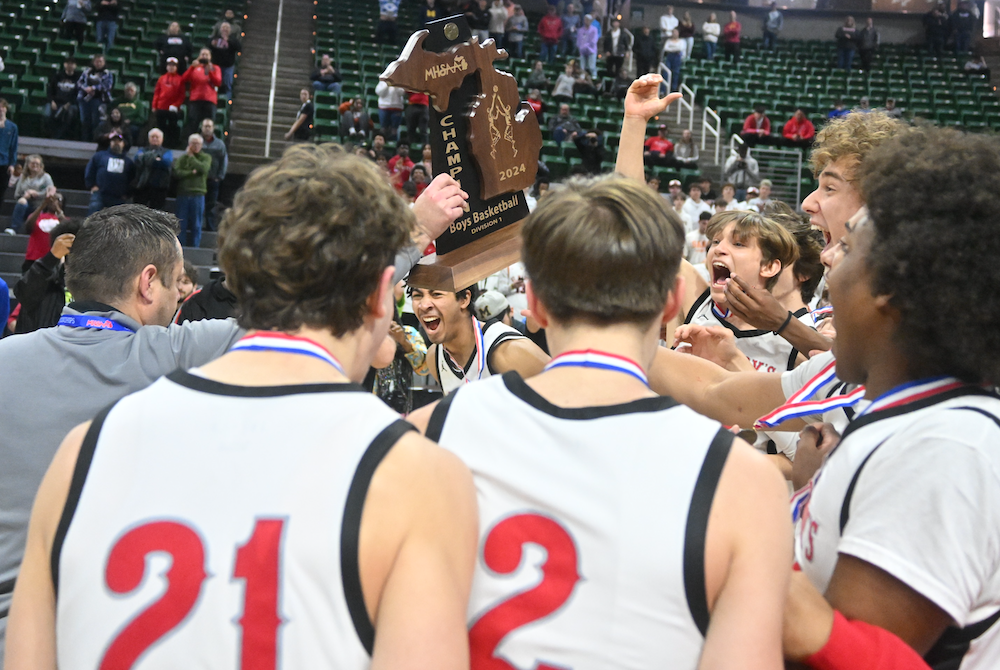
McKenney Grows Legend in Leading St. Mary's to 1st Title since 2000
By
Keith Dunlap
Special for MHSAA.com
March 16, 2024
EAST LANSING — At one point early in the fourth quarter of Saturday’s Boys Basketball Division 1 Final, Orchard Lake St. Mary’s junior Trey McKenney had scored as many points as North Farmington had as a team.
That pretty much tells the story of who the man of the day — and arguably the season — was for 2023-24.
McKenney showed why he is one of the most highly-regarded juniors in the entire country, finishing with 32 points to lead St. Mary’s to a 63-52 win over North Farmington and its first Finals title in Division 1 or Class A, the predecessor division for the state’s largest schools.
“We’ve been going at it every day,” McKenney said. “Just being consistent. I don’t think it’s really sunk in, winning a state championship. It’s kind of crazy.”
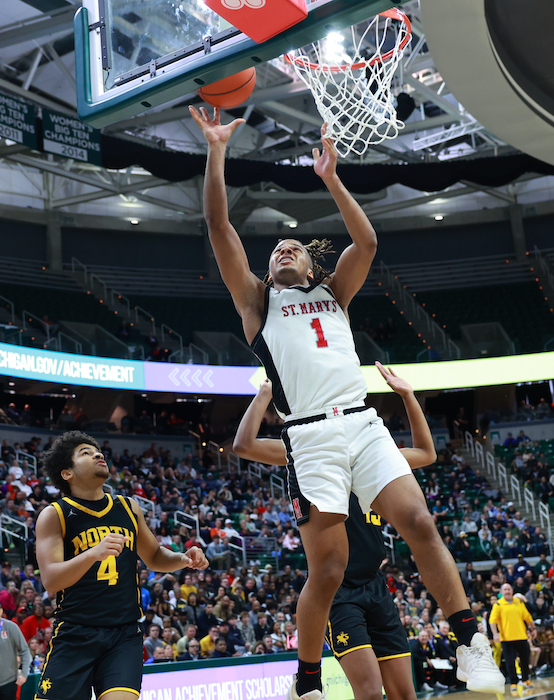 McKenney finished 8 of 11 from the field overall and made all 14 of his free-throw attempts. He added 10 rebounds.
McKenney finished 8 of 11 from the field overall and made all 14 of his free-throw attempts. He added 10 rebounds.
After the game, North Farmington head coach Todd Negoshian could only ask, “Can he graduate early?”
“He’s tough. He does a lot of things. He’s got the NBA style game right now with floaters and fadeaways. He’s so strong,” Negoshian added.
St. Mary’s (27-1) won its fifth Finals title and first since earning the Class B crown in 2000.
Ranked No. 1 for most of the year, the Eaglets navigated through that high expectation and all the way to the top of Division 1 after losing in a Semifinal last year.
“We’ve been dreaming about this a long time,” St. Mary’s head coach Todd Covert said. “This is a dream come true. It means everything.”
St. Mary’s was in control throughout, until late in the game when North Farmington made things interesting.
Trailing 46-26 with 6:27 remaining, North Farmington amped up its full-court pressure, created turnovers and did something it struggled to do prior to that point – make shots.
The Raiders cut their deficit to 59-50 with 1:46 remaining after a free throw by senior Landon Williams, making up much of the margin despite leading scorer Tyler Spratt fouling out with 3:27 left when St. Mary’s was up 55-39.
But that was as close as the Raiders could get, as McKenney essentially wrapped up the game by hitting two free throws with 12.9 seconds remaining to give the Eaglets a 63-52 lead.
St. Mary’s made 17 of 18 shots from the free-throw line during the fourth quarter.
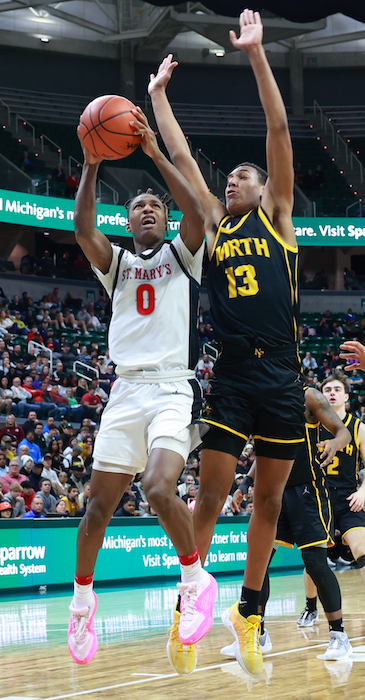 “That was the longest fourth quarter of my life,” Covert said. “It seemed like there was seven guys out there. But we weathered the storm, and that is what it’s all about.”
“That was the longest fourth quarter of my life,” Covert said. “It seemed like there was seven guys out there. But we weathered the storm, and that is what it’s all about.”
Spratt finished with 17 points, and Williams had 16 to lead the Raiders (24-3).
Saturday was North Farmington’s second championship game appearance after the Raiders faced a similarly elite player in Cassius Winston with Detroit U-D Jesuit in 2016.
“I thought we wore them down a little bit to where they ended up turning the ball over,” Negoshian said. “I thought we struggled to score at times. I think we got it to where we wanted to with them turning it over and keeping us right where we needed to be within striking distance. But we just couldn’t score at times offensively, and I think that was our downfall tonight.”
Trailing 25-19 at halftime, North Farmington cut the St. Mary’s lead to 25-22 with 6:56 left in the third quarter on a 3-pointer by Rob Smith.
But McKenney answered by scoring the next seven points, and then senior Andrew Smith drained a 3-pointer from the top of the key to give the Eaglets a 35-22 lead with 3:17 remaining in the third. McKenney then hit a jumper from the baseline to finish off a 12-0 run and push the lead to 15.
PHOTOS (Top) Orchard Lake St. Mary’s coach Todd Covert presents the Division 1 championship trophy to his players Saturday at Breslin Center. (Middle) The Eaglets’ Trey McKenney (1) gets to the basket for two points. (Below) St. Mary’s Sharod Barnes (0) gets a shot up with Dylan Smith (13) defending. (Photos by Hockey Weekly Action Photos.)

